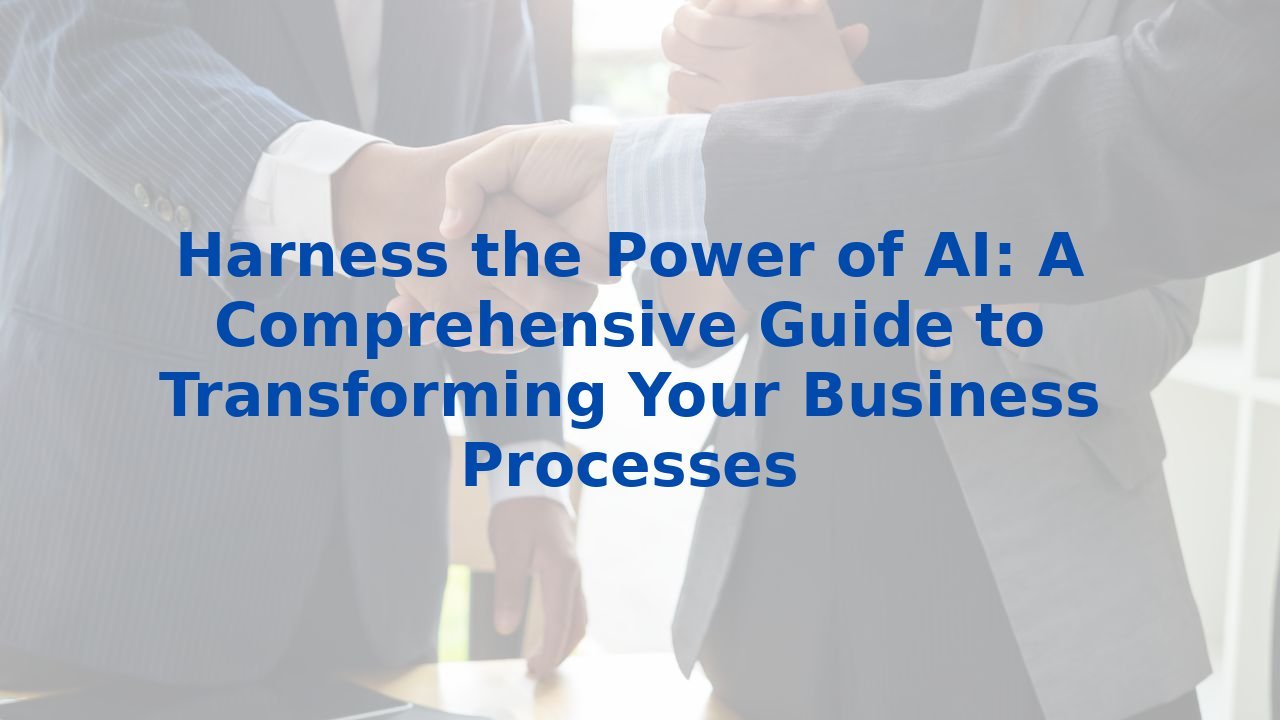Harness the Power of AI: A Comprehensive Guide to Transforming Your Business Processes
Harness the Power of AI: A Comprehensive Guide to Transforming Your Business Processes
In an era where the pace of business is constantly accelerating, the imperative to enhance efficiency, reduce costs, and make astute decisions has never been more pronounced. Enter Artificial Intelligence (AI)—a dynamic force that is reshaping how organizations operate. This article explores how AI can uplift fundamental business processes, highlighting the transformative advantages it brings and underscoring the necessity of training employees to harness its full potential.
Enhancing Business Processes with AI
At its core, AI integration in business process management (BPM) signifies the utilization of AI capabilities to construct, analyze, automate, and refine workflows. Embracing this powerful technology opens the door to numerous benefits, including:
- Data Analysis: The ability of AI to sift through massive datasets means it can unveil trends, predict outcomes, and provide insight that enhances decision-making.
- Process Building: AI can facilitate the creation of more effective processes by drawing on historical data, significantly reducing the effort required in process mapping.
- Automation: Daily tasks can be automated, minimizing errors and freeing employees to focus on more strategic endeavors.
Key Areas Where AI Enhances Business Processes
There are several crucial areas within an organization where AI makes a substantive impact:
1. Human Resources (HR) Processes
- Recruitment: AI streamlines recruitment by synthesizing data on performance, trends, and market benchmarks to help HR professionals formulate competitive offers.
- Employee Onboarding: By personalizing onboarding processes, AI enhances the overall employee experience while automating administrative responsibilities.
- Employee Management: Anticipating attrition trends with AI allows organizations to proactively retain their top talent.
2. Sales Processes
- Lead Scoring: AI identifies the most effective sales channels and potential upsell opportunities, optimizing sales strategies.
- Content Generation: Drafting automated content for marketing communications saves valuable time for sales teams, enabling them to concentrate on more significant sales activities.
- Customer Interaction: Through AI-powered chatbots, potential customers receive real-time responses, greatly enhancing service efficiency.
3. Customer Service
- Chatbots: AI chatbots manage basic customer inquiries, alleviating the workload on support teams and accelerating response times.
- Feedback Analysis: AI shows its prowess in parsing customer feedback, identifying actionable insights to elevate customer service quality.
4. Product Development
- Generative Design: Utilizing AI allows for an explorative design process that can save time and resources.
- Predictive Analytics: AI evaluates pricing strategies for products, providing insights to maximize profitability while retaining customer sentiment.
5. Supply Chain Management
- Anomaly Detection: Monitoring purchase data in real-time enables AI to detect outliers and alert teams to potential supply chain disruptions.
- Order Fulfillment: AI streamlines the ordering process by communicating directly with supplier systems, enhancing responsiveness.
The Benefits of AI for Improving Efficiency
The integration of AI into business processes yields significant enhancements in operational efficiency, primarily by:
- Reducing Errors: Automated tasks reduce human error, ensuring processes are completed accurately and reliably.
- Improving Decision-Making: AI can provide predictive insights based on data patterns, refining the decision-making process for organizations.
- Enhancing Productivity: The automation of routine tasks ensures employees can dedicate more time to innovative and strategic initiatives.
The Importance of Employee Training for AI
Despite the immense capabilities of AI, its full potential can only be realized with comprehensive employee training. Effective training programs should encompass:
- Understanding AI Capabilities: Educating employees on what AI can achieve guarantees appropriate use and maximizes efficiency.
- Data Interpretation: Training should equip employees to understand AI insights, enabling informed decision-making based on accurate interpretations.
- Integration with Existing Systems: Familiarizing staff with integrating AI into their current workflows ensures a seamless transition and boosts productivity.
- Continuous Learning: As AI technologies evolve, fostering a culture of continuous learning is key for adaptation and staying ahead in innovation.
In conclusion, AI holds transformative potential for business process management through enriched data analysis, efficient process creation, and effective automation. Organizations that adopt AI strategies can not only enhance operational efficiency but also empower their workforce through comprehensive training. This combination sets the stage for enduring success and innovation in an increasingly competitive landscape.



